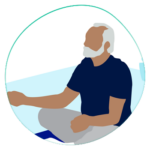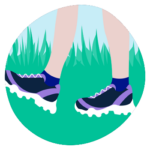Complementary therapies

Carlos A Ortiz de M Soto (Aplastic anaemia survivor)

- Complementary therapies are forms of practice and products used alongside conventional medicine.
- Complementary medicines are non-prescription medicines.
- Integrative medicine (IM) combines conventional care and complementary therapies.
- Alternative therapies are used in place of conventional medicine.

Professor David Joske
It is important to use complementary therapies safely. Complementary therapies may be perceived as safe. But some cause harm by interacting with conventional and prescribed medicine. Others provide no benefit. Some potential interactions with treatment can:
- Make treatment side effects worse
- Reduce the anti-cancer effect of the treatment
Determine the benefits and risks, and ensure the information is reputable. Discuss any complementary therapies you plan to use with your treatment team. Developing a comprehensive plan with your treatment team can ensure the complementary therapies are effective and safe for you.
The Understanding complementary therapies booklet from the Cancer Council has a question checklist on page 70-72 of things to consider and questions to ask.
Some types of complementary therapies
Acupuncture
Acupuncture is a procedure involving stimulation of anatomical locations on the skin by a variety of techniques. Generally, this is through using fine needles. It is important to talk to your treatment team before undergoing acupuncture. Studies suggest that acupuncture can:
- Reduce cancer pain
- Improve chemotherapy induced nausea
Aromatherapy

- Reducing anxiety and depression
- Improving sleep
- Improving memory
- Increasing appetite
Cognitive behavioural therapy (CBT)
Cognitive behavioural therapy (CBT) is used to modify cognition with rational thinking. It helps people gain a sense of control and increase their confidence. Studies on cancer patients showed that CBT:
- Significantly reduced depression and anxiety
- Improved quality of life
- Reduced pain
- Reduced cancer related fatigue
Exercise

- Cancer related fatigue
- Pain
- Anxiety
- Depression
- Bone health
- Brain function
- Physical fitness
- Quality of life

Professor David Joske
Light therapy (for sleep)
There is some data suggesting that light therapy may benefit cancer patients. It is thought light therapy may:
- Help regulate circadian rhythm to improve sleep quality
- Suppress the release of the sleep hormone melatonin during the day, to help increase activity
Massage
Light and relaxing massage is generally safe for people at all stages of cancer. Studies have shown that massage can:
- Decrease pain
- Improve fatigue
- Reduce nausea
- Improve quality of life
- Reduce anxiety
Medicinal cannabis
Medicinal cannabis approved for medical use has the active ingredients delta‐9‐tetrahydrocannabinol (THC) and cannabidiol (CBD). They are generally oral preparations, like oil, spray or capsules. Most products are unregistered and require approval to be prescribed through a special access scheme.
Data suggests medicinal cannabis may have some effect in:
- Treatment of chemotherapy induced nausea and vomiting
- Appetite stimulation
- Pain relief in combination with other pain medications
Meditation

Meditation is known to help cancer patients by:
- Improving sleep
- Reducing pain
- Improving fatigue
- Reducing nausea
- Lowering blood pressure
Mindfulness
Mindfulness is being present in the moment without judgement. It can take practice to notice thoughts, feelings or experiences, then accept them and focus on the present moment.
The use of mindfulness in cancer has shown:
- Reduction in stress, anxiety and depression
- Increased belief in self
- Improved sleep
- Reduced fatigue
- Improvement in pain
- Increased food intake for those underweight
Music therapy
Music therapy can involve listening to or creating music. It can be singing in a choir, playing an instrument.

Dr Stephanie Thompson

- Depression
- Anxiety
- Hope
- Pain
- Fatigue
- Heart rate
- Blood pressure
- Quality of life
- Resilience
Nature prescription

It can improve health in several ways:
- Walking in green spaces can improve physical well being
- Breath work or meditation in nature can improve psychological well being

Sophie Gray (AML survivor)
Nutrition supplements and herbal medicines

Check with your treatment team before starting any of these as many can interact with other medications. It may be recommended for you to delay their use until post treatment.

Sophie Gray (AML survivor)
Vitamin C given intravenously (IV) in high doses is widely used by cancer patients. There is no evidence that it treats cancer or helps other cancer treatments. There are ongoing studies on its effectiveness to reduce cancer treatment side effects. There is some evidence that it may help improve:

Nutrients | Free Full-Text | High-Dose Vitamin C in Advanced-Stage Cancer Patients (mdpi.com)

Professor David Joske

There is currently no evidence that it treats cancer, it has side effects and has the potential to interfere with some cancer treatments.
Qigong
Qigong is mind-body exercise, it uses a combination of meditation, breathing, and movement. Practicing qigong is known to:
- Improve fatigue
- Improve mood
- Help regulate emotion and stress
- Improve sleep
Writing therapy

- Give permission to express emotions
- Provide a means to reflect on fear and uncertainty
Yoga
Yoga combines poses, breathing techniques, meditation and mindfulness. It can be beneficial in improving adverse symptoms from cancer and its treatment.
There is data to suggest it improves:
- Psychological well being
- Physical health
- Emotional regulation
- Quality of life
Advice Professor David Joske provides to his patients during treatment
- You need to understand and be committed to your medical plan.
- You need to make your own plan to manage the situation.
- Being calm is more important than being positive.
- Lifestyle management: diet, stress, antioxidants (no evidence of benefit for supplements), exercise, complementary therapies.
- Leave supplements until after treatment.
- Exercise is the single best thing you can do to help yourself.
- Resolve stress – get your life how you want it to be.
- Trust your instincts.
Watch Complementary Therapies for more information from Professor David Joske.
More information
References
Last updated on July 11th, 2024
Developed by the Leukaemia Foundation in consultation with people living with a blood cancer, Leukaemia Foundation support staff, haematology nursing staff and/or Australian clinical haematologists. This content is provided for information purposes only and we urge you to always seek advice from a registered health care professional for diagnosis, treatment and answers to your medical questions, including the suitability of a particular therapy, service, product or treatment in your circumstances. The Leukaemia Foundation shall not bear any liability for any person relying on the materials contained on this website.